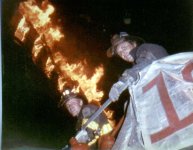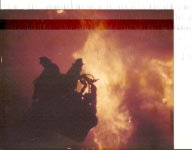You are using an out of date browser. It may not display this or other websites correctly.
You should upgrade or use an alternative browser.
You should upgrade or use an alternative browser.
Tower Ladders vs Rear Mount straight ladders
- Thread starter jlab
- Start date
- Joined
- May 25, 2022
- Messages
- 1,097
Just a guess but the large majority of battalions in the FDNY have ATLEAST one Tower. I remember seeing something a chief said (I think I could be yapping) that when possible you want a Tower Ladder on your scene. Makes it easier incase you got to go exterior you don't need to wait longer for a TL. Alot safer and easier to make grabs from windows aswell.How doe the powers that be in the FDNY decide whether a ladder company should be assigned a Tower ladder or a rear mount straight ladder ?
- Joined
- Dec 7, 2018
- Messages
- 3,859
If I am not mistaken if 3 Sticks are assigned the 4th one is required to be a Tower Ladder. Or maybe it’s the 5th.
- Joined
- Nov 1, 2019
- Messages
- 622
when they came into the job in the mid 60’s, O’Hagen wanted at least one to be on the report of the 10-30/10-75. Would imagine that location, types of occupancies play into it.
- Joined
- Apr 23, 2018
- Messages
- 1,191
The original design by Chief O'Hagan was to have a TL and RM assigned to every box. But of course this is/was not always possible...During the selection process, L 31 was supposed to become a RM, but the Captain (who was buddies with O'Hagan) convinced him to send L 31 a TL, and instead of L 19 being a TL, it became a RM.
- Joined
- Sep 7, 2020
- Messages
- 2,707
The attached video shows some great companies doing an outstanding job at a bread and butter job. But it demonstrates some a great aerial device comparison. There is no better airborne fire killer than the aerial scope. There is also no better aerial device for rapid roof access or a single point window grab than the FDNY spec straight stick. Look at the video. At 0:19 TL44 is beginning to drop its tormentors. At 1:19 L27 comes to a complete stop in front of the fire building. 1 full minute behind the TL. At 2:46 ladder 27 is on the roof. At 3:00 both members from L27 and TL 44 transition onto the roof. Well done lads.
- Joined
- Jan 12, 2022
- Messages
- 80
Always was told tower ladder vs aerial ladder placement had to do with the building in that units first due response area.
- Joined
- Apr 8, 2007
- Messages
- 138
Nice stop by 92/44, and WOW what a "stop" by 27 truck. Chauffeur dumped the parking brake perfectly.
Fire blowing out the kitchen window?
Fire blowing out the kitchen window?
- Joined
- Apr 23, 2018
- Messages
- 1,191
Not really, the Bronx is made up with the same types of structures whether your in E 45's area, to E 89's area to Hunts Point. H Buildings, TAXPAYER- and row frames. Same as in Brooklyn and Queens. The neighborhood make-up are all the same generally speaking.Always was told tower ladder vs aerial ladder placement had to do with the building in that units first due response area.
- Joined
- Jul 20, 2022
- Messages
- 428
Every NYC Borough has a lot of tall buildings and sometimes a 75-foot Tower ladder will not reach to the roof. Some FDNY Tower Ladders are 95 feet but not all. So, in tall buildings a 100-foot aerial ladder are often, needed for access to the roof. In advanced fires on lower floors, or shorter buildings the front of the fire building should be kept for Tower Ladder/s, at serious advanced fires. "The front of the building belongs to the truck" and a visible life hazard generally trumps all other considerations. I know money is always a consideration, but FDNY would do well to consider at least one large Tower Ladder, over 100 feet in each Division. The London Fire Brigade in the U.K. has taken delivery of two, 206-foot aerial devices in response a multiple fatality in a London U.K. 

 Highrise Dwelling. Toronto Canada has at one 270 ft. Tower Ladder. I spent almost 20 years working in busy FDNY Tower Ladders in the South Bronx and 2 Areas in Manhattan. Nothing is generally better at controlling advanced fires than a properly position and utilized Tower Ladder. Captain Bob Rainey FDNY Engine 26 retired.
Highrise Dwelling. Toronto Canada has at one 270 ft. Tower Ladder. I spent almost 20 years working in busy FDNY Tower Ladders in the South Bronx and 2 Areas in Manhattan. Nothing is generally better at controlling advanced fires than a properly position and utilized Tower Ladder. Captain Bob Rainey FDNY Engine 26 retired.


 Highrise Dwelling. Toronto Canada has at one 270 ft. Tower Ladder. I spent almost 20 years working in busy FDNY Tower Ladders in the South Bronx and 2 Areas in Manhattan. Nothing is generally better at controlling advanced fires than a properly position and utilized Tower Ladder. Captain Bob Rainey FDNY Engine 26 retired.
Highrise Dwelling. Toronto Canada has at one 270 ft. Tower Ladder. I spent almost 20 years working in busy FDNY Tower Ladders in the South Bronx and 2 Areas in Manhattan. Nothing is generally better at controlling advanced fires than a properly position and utilized Tower Ladder. Captain Bob Rainey FDNY Engine 26 retired.The big advantage with the older RM was 1 tormentor on the building side and aerial was able to be extended to the roof or wherever needed unless Life was a priority. TL had to have all tormentors extended to raise bucket. We all know speed is necessary for life saving operations. When I left the truck we had a 91 Seagrave 100Ft. and the one tormentor rule was the normal MO.
- Joined
- Sep 7, 2020
- Messages
- 2,707
R = Rearmount = rescue/RoofYou’re right Tony, it does take a tower longer but the bucket can reach multiple windows and floors for removal if necessary. I worked in both and each has its pluses and minuses. They make for a great fire department.
T = Tower Ladder = Tons of water.
LOL. Happy Holidays
- Joined
- Apr 23, 2018
- Messages
- 1,191
Agree with Lt. Q, worked on all three types (quickest set up, tiller!)...Now, If you were hanging by your fingernails and a RM and TL showed up at the same time...?
There are sixteen 95-foot tower ladders currently in service.How many TL's are 100 ' ?
